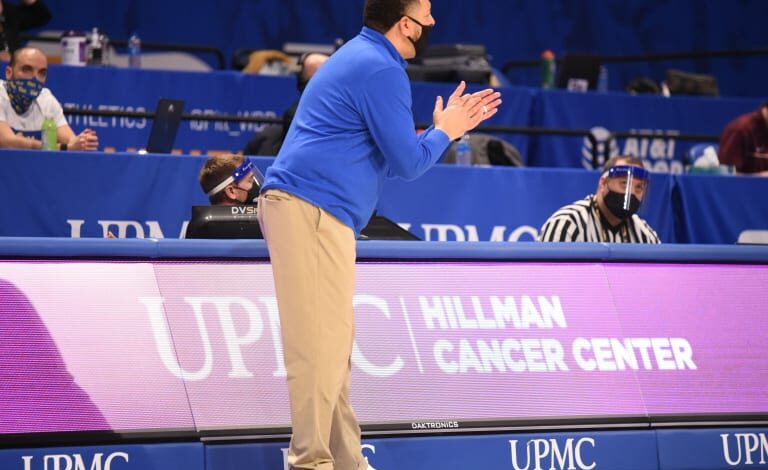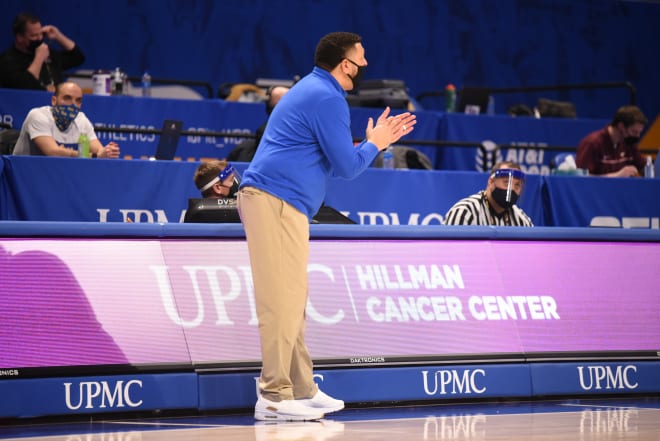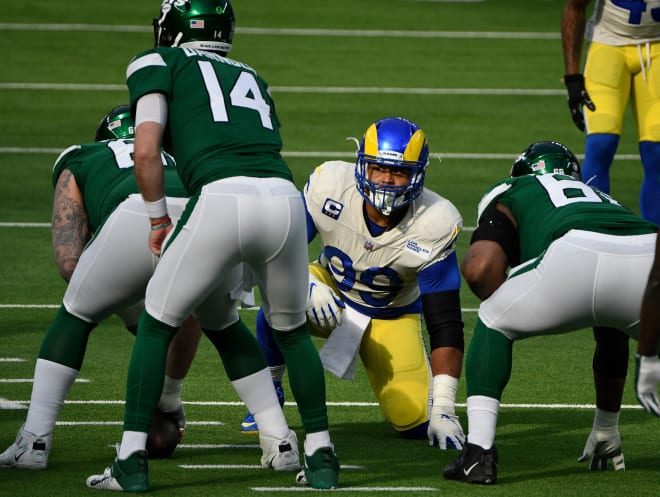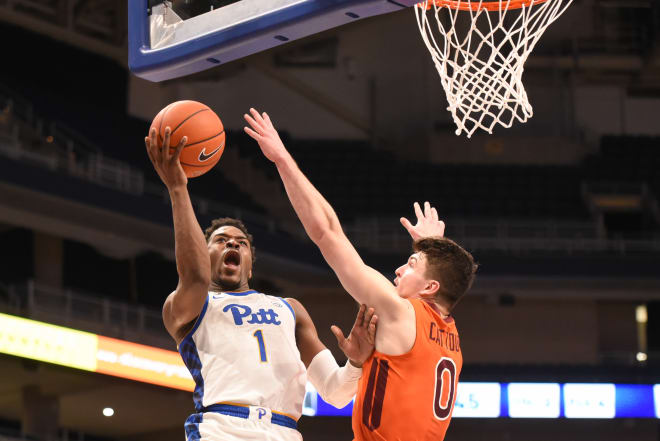lair – The 3-2-1 Column: The right direction, the NFL, 10 wins and more

In this week’s 3-2-1 Column, we’re thinking about encouraging losses, 10-win seasons, Pitt in the pros and more.
THREE THINGS WE KNOW
The right direction
I’ll say it from the start: I don’t want to use the phrase “moral victory.”
I do think moral victories are a thing. I think there are games where a team might lose but perform admirably enough to provide encouragement about its prospects for the future.
I think games like that do happen, but I also know that the phrase – “moral victory” – is not exactly one that fans are fond of. So I won’t use it here. Instead, I’ll say “encouraging loss.” Because that’s what Pitt’s 73-66 loss at Virginia was last Saturday.
It was encouraging.
You can start with the numbers, as Pitt lost a road conference game by seven despite being 11-point underdogs. That’s pretty solid, at least in terms of performance vs. expectations.
More to the point, though, is the fact that the Panthers more or less played the No. 9 Cavaliers even for the vast majority of the game. That’s not hyperbole or guesswork; it’s true. After trailing by three at halftime, Pitt had the game tied at 36-36 with 16:21 left in the second half. But over the next four minutes, Virginia went on a run, shooting 4-of-4 from beyond the arc and hitting four free throws while Pitt missed all four of its attempts from the floor and didn’t grab a single offensive rebound.
The result was a 16-0 run, and four minutes after tying the game at 36-all, Pitt trailed 52-36.
That was the game right there. That’s what decided the outcome. For the other 36 minutes of the game, the Panthers were nine points better than the Cavaliers. They even outscored the home team by nine over the final 12 minutes, mounting a valiant effort to keep it somewhat close.
That effort wasn’t enough, of course, but for 36 minutes, Pitt was every bit the equal of Virginia, who stands as the ACC’s best team. I know you can’t ignore that 4-minute stretch. You can’t pretend like it didn’t happen or that it doesn’t count into your evaluation of the Panthers in that game.
But I also think you shouldn’t ignore the 36 minutes outside of that 16-0 run, when Pitt acquitted itself quite nicely. Call it a moral victory if you like; I’m going to say it was a loss with encouraging signs.

Competitive with anybody
I’m also coming to a certain conclusion about this 2020-21 Pitt basketball team:
When they show up to play, they can be competitive with anybody, at least in the ACC.
Now, the first part of that sentence – “When they show up to play” – is a loaded phrase; I’ll admit that. We’ve seen what it looks like when Pitt doesn’t show up. They lose to Wake Forest. They get blown out by Notre Dame. They drop a gimme season opener against St. Francis. This team is very much capable of having a game like that on any night.
But they’re also capable of more. They’re capable of what they did against Syracuse twice, what they did against Duke and what they did against Virginia Tech. And even in losses, they showed they were capable of hanging with Virginia and Louisville, even when they didn’t have two of their three best players available.
They are very capable, and if an opponent overlooks the Panthers, that opponent does so at its own peril.
If the Panthers show up.
I know, you’d like to think that the question of showing up is not one a team would be facing. That should be automatic: you show up to play and give 100% every night. Ideally, that would be the case. But it’s not, and which Pitt team walks into the arena is kind of up in the air on an almost nightly basis.
Still, I think if that’s the biggest question facing the team, rather than questions of talent or personnel or depth, then that’s a positive. The Panthers have questions in those other areas – talent, personnel, depth – but they are not nearly as severe as they have been in years past; they are not reasons to count Pitt out before a game even starts.
Of course, this is not to say that Jeff Capel has a perfect team in his third season. He doesn’t. There are obvious issues in defending the perimeter, and the depth is a problem that could catch up to the Panthers if they run into foul trouble or injuries. But if the top six or seven guys in the rotation are really committed to playing hard, they’re good enough to give just about anybody a battle.
Unlike any other
I often think about how we’ll reflect on this period.
You know what I mean. What period I’m talking about. It’s the stretch from last March until…well, until some point in the future where we’re actually in a position to look back on All of This.
I think about this a fair amount. I think about it in the context of things in my life, and I think about it in the context of sports.
I know how tough it has been just to live “regular” life. And maybe “tough” isn’t the right word. We’ve all been living under a cloud for the last 11 months that has changed virtually every aspect of life, whether it’s dealing with turning the dining room into a classroom, turning the living room into an office or turning the kitchen into a restaurant.
That’s just inside the house. When you venture outdoors, whether it’s to the store or…well, I don’t know what else you’ve been doing; there aren’t a lot of options. But when you leave the house, you never have to look far to be reminded that things are different. Masks, social distancing markers and everything being a little more empty than usual – it all tells you that something is going on.
And it weighs on you. It’s not quite pressure; it’s more like humidity that you can’t really stop thinking about it because it’s omnipresent.
So all of our lives have been subject to some upheaval, and the expectations and standards have changed as a result. Sports have been no different. Everything has been turned upside down for coaches and players, and that brings me to a question:
How much of a pass will they get for operating under these circumstances?
I asked some version of this in the fall when the college football season was serving as a guinea pig of sorts. College football tried to see how close it could fly to the sun – with “the sun” being any semblance of regular-ness or normalcy – and the results were mixed, at best.
Still, that didn’t automatically save everyone’s jobs. Tom Herman, Will Muschamp, Jeremy Pruitt, Gus Malzahn, Kevin Sumlin, Derek Mason and Lovie Smith all got the axe in the Power Five; pandemic or no, the administrations at those schools decided to make a change.
I was a little surprised there were that many, but I guess I should never underestimate the world of college sports, even if decisions cost a lot of money in a year where money is running tight.
That said, I still wonder how much of a factor the pandemic will be as college administrators evaluate the 2020-21 basketball season when it’s done. Jeff Capel has not been shy in speaking out about the challenges of this year, and he’s not alone in that regard. I don’t think Capel is trying to make a public case for his job or anything – he’s not in danger of losing his job, and I don’t think his team’s performance this year would merit it anyway – but the message is clear:
Capel can’t emphasize enough how different this season has been and how challenging it has been for the players. He doesn’t usually mention the challenges for the coaches, but those exist, too.
I don’t know. I don’t think I’m really driving at any particular point here. I’m just wondering aloud about a question that I don’t think we can really answer. And I’m interested to see what we all think when we look back in a few years.

TWO QUESTIONS WE HAVE
How are Pitt’s former players doing in the NFL?
Let’s flip to football for a bit. Pro football, that is, with a Pitt connection since two former Panthers were on the Super Bowl-winning Tampa Bay Buccaneers roster.
That would be safety Jordan Whitehead, who was a starter for the Bucs’ defense in their win over the Kansas City Chiefs, and running back LeSean McCoy, who didn’t play at all on Sunday.
For McCoy, it’s the second year in a row that he has won a Super Bowl while contributing very little, but you know what? I’m not holding it against him. McCoy was arguably the best running back in the NFL over the last decade, and that’s not hyperbole: he led the league in rushing yards from 2010-19, was second in rushing touchdowns and had more scrimmage yards than any other running back as he toiled away in Philadelphia and Buffalo.
He missed the Eagles’ Super Bowl by three years and he missed the maturation of Josh Allen by two, so while he might not have done much to help the Chiefs last year or the Bucs this year, I’m perfectly fine with him claiming a couple rings to cap what should be a Hall of Fame career.
As for Whitehead, I think we’re seeing a star blossom in the pros. He was very good at Pitt, as you know, and now it looks like Tampa Bay got a steal. Whitehead has started more than 40 games since the Bucs took him in the fourth round of the 2018 NFL Draft, and he keeps getting better and better. He forced two fumbles in the playoffs this year and recorded two tackles in the Super Bowl despite playing with a torn labrum.
Of course, we can’t talk about pro Panthers without mentioning Aaron Donald. I feel like it would be a waste of space to talk about the numbers and the accomplishments, so I’ll make it as succinct as possible:
If Donald retired today, at age 29 with seven years played in the NFL, he would be a surefire Hall of Famer. I don’t think there’s any question about it, and there aren’t many guys his age that you can say that about.
We would certainly say it about Larry Fitzgerald, but he’s got a few more years in the bank than Donald. He’s a legend in the game, the second-best receiver of all-time with only a championship missing from his resume, and that’s a direct product of him playing in Arizona for his entire career.
Speaking of receivers, Tyler Boyd is quietly becoming – or has already become – one of Pitt’s best pro players. He has averaged better than 60 catches and 700 yards per season since entering the NFL in 2016, and I think the growth of Joe Burrow could elevate Boyd to superstar status sooner rather than later. If you take Boyd’s numbers from the 11 games he played with Burrow this season and project them over 16 games, you get 110 catches and 1,136 yards. And that’s with Burrow as a rookie; he’s only going to get better, and Boyd’s production is only going to go up.
And we can’t leave out Brian O’Neill. He was a second-round pick in 2018 and has started 44 games since his rookie season. O’Neill is carving out a nice career for himself.
There are more Pitt players in the NFL, of course. There are guys like James Conner and Dion Lewis and Ryan Lewis and Avonte Maddox and Andy Lee and Jabaal Sheard, plus a handful of players like Dane Jackson who could get chances in 2021.
It’s not the biggest group of NFL players from a single college. In September, the NCAA announced Alabama – no surprise – as the “champion” in that category with 56 former players in the league. Pitt, by comparison, had 14. But it’s a solid group with some star players leading the way at the top.
Can a 10-win season happen?
This is a random question, but some version of it came up a couple times in the Panther-Lair.com Mailbag this week, so I thought we could address it here in a slightly different way.
You know all of those players I just talked about? Donald and McCoy and Fitzgerald and Whitehead and Boyd and O’Neill? You know what all of them have in common, beyond being among the best in the NFL?
Not one of them was on a 10-win team during their time at Pitt. McCoy and Fitzgerald each played on nine-win teams (Fitzgerald in 2002; McCoy in 2008), but Donald’s teams won eight, six, seven and six games and Whitehead’s went 8-5, 8-5 and 5-7. Boyd was on a 7-6 team, a 6-7 team and an 8-5 team; O’Neill was on the latter two of those, plus another 8-5 and a 5-7.
Of course, that doesn’t make those guys all that unique among Pitt players because, as we know, 10-win seasons are something of a rarity around these parts. The Panthers have hit that mark just once since 1981. That’s one time in 39 seasons.
I guess I can understand why people wonder if Pitt actually can win 10 games in a season. When it has only happened in 2.6% of the last 39 seasons, it does feel pretty improbable and maybe even unlikely. The thing is, I don’t think it’s as difficult as it seems. I don’t think Pitt should enter any given 39-year stretch with only a 2.6% chance of winning 10 games.
And the reason I think that, primarily, is because Pitt has had plenty of chances to win 10 games over the last 39 years. Hell, just over the last 15 years, there have been a bunch of opportunities.
Like that 2008 team that McCoy played on. That team is probably one of the more underrated – or at least overlooked – teams in recent Pitt history. Those Panthers went 9-4, but inside of that record were losses to Bowling Green and Rutgers and a 3-0 Sun Bowl game.
If even one of those games goes the other way, Pitt is at 10 wins, and I don’t think it’s crazy to suggest that the Panthers should have won at least two out of those three, if not all three.
Or the 2003 team that Fitzgerald played on. They entered the season ranked in the top 10 and disappointed at 8-5. But we can start with the infamous loss at Toledo to get to nine wins and then take your pick of Notre Dame or Virginia – both were one-score losses that probably should have gone the other way to get to 10.
Even Donald played on a team that we could what-if to 10 wins. The 2014 Pitt team went 6-7 in Paul Chryst’s final year with the Panthers, and those seven losses included a home defeat at the hands of Akron, the fumble-fest disaster against Georgia Tech, a missed chip-shot field goal that should have beat Duke and the how-many-onsides-kicks-can-they-recover bowl game against Houston.
Count ‘em: that’s four would-be wins that weren’t. That’s the difference between 6-7 and 10-3.
I’m cherry-picking; I know that. And I’m playing the what-if game when the results are what they are. But my point stands. Pitt hasn’t been that far from multiple 10-win seasons over the last two decades. The Panthers have just stumbled too many times, for whatever reason.
Figuring out how to prevent the stumbles is the big question.

ONE PREDICTION
Pitt’s not playing 20 conference game
Okay, I admit it: I’m recycling this one.
I mean, I probably am. I don’t actually keep track of predictions or topics covered in previous columns. So while I know that I’ve felt for a long time that Pitt wasn’t going to get a full conference schedule in, I don’t recall if I wrote about it.
But the topic came up again this week when Pitt’s game at Louisville was postponed. The Cardinals are a mess right now, with head coach Chris Mack leading a sizeable contingent of COVID-19 positive tests, along with contact tracing and quarantining and all of those things we have heard about for the last year.
Those issues have led to four Louisville games in a row getting put on ice dating back to last week when games at Syracuse and Virginia were postponed. The Pitt-Louisville game was the Cardinals’ third postponement, and their game at Virginia Tech this Saturday has already been postponed.
Welcome to 2021. Same as 2020.
If you’re keeping track at home, Pitt has now had six games postponed this season. Technically, it’s probably more like eight, since the home game against Florida State has been postponed three times, but we’ll go with six. Two of those have been rescheduled: the home game against Notre Dame got moved from Jan. 2 to Jan. 30 and the game at Georgia Tech on Jan. 13 was moved to this Sunday, Feb. 14.
That leaves four games still unscheduled. Pitt was supposed to play at Duke on Dec. 29, but that one got bumped due to COVID-19 issues at Pitt. The Panthers were scheduled to play at Boston College on Jan. 23, but that had to get postponed due to issues with the Eagles. And then there’s the thrice-postponed game against Florida State and this most recent postponement, the game at Louisville.
That’s four games, and time is running out to make them up. In fact, there isn’t any time to make them up. Not all of them, at least. The ACC generally puts teams on a two-games-a-week schedule with a weekend game and a midweek game. With that in mind, Pitt has a game this weekend (Sunday at Georgia Tech), a midweek game next week (Wednesday vs. N.C. State), then a weekend game (next Sunday vs. Clemson), then a week off before playing on Sunday, Feb. 28, at N.C. State. Tuesday, March 1, vs. Wake Forest and Saturday, March 6, at Clemson fill out the regular-season schedule.
On the two-games-a-week model, Pitt has one opening to fit four unscheduled games.
So unless the ACC changes its schedule policy and teams agree to play three games in a week, it’s not happening. And even then, with three games in a week, it’s probably not happening. Pitt could maybe play two of its makeup games on Tuesday/Thursday in the week of Feb. 21; it would be a quick turnaround, but at least they’d get two more games in.
But that still leaves two un-played, and it means the Panthers aren’t finishing their schedule.
My guess is the ACC will try to get one of Pitt’s postponed games into that week between Clemson on Feb. 21 and the road trip to N.C. State on Feb. 28, and the other three games will fall by the wayside.
To be honest, if the Panthers get 17 ACC games in, I’ll consider that a win.
Source link






